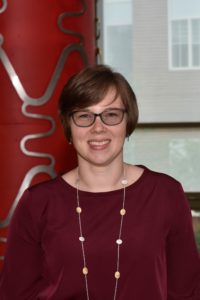|
Dr. Katharina Maisel obtained her BSE in Materials Science and Engineering from the University of Michigan and PhD in Biomedical Engineering from Johns Hopkins University. She completed her postdoctoral training at the University of Chicago in lymphatic and respiratory immunobiology prior to joining the Fischell Department of Bioengineering at the University of Maryland as faculty in 2019. The Mucosal Associated Immune System Engineering and Lymphatics (MAISEL) Lab’s research integrates materials science, immunology, mucosal barrier physiology, and drug delivery to design nanoparticles to take advantage of and study the interface between biological barriers, particularly the lymphatics, interstitial tissue, and mucosal surfaces, and nanoparticles. Dr. Katharina Maisel has won a number of awards, including NSF GRFP and NIH F32 fellowships as a trainee, the American Lung Association Dalsemer Award, LAM Foundation Career Development Award, NSF CAREER Award, and NIH NIGMS Maximizing Investigator Research Award. Her work has led to numerous high-impact publications, particularly in the field of drug delivery and mucosal and lymphatic immunoengineering, and several patents. Find out more about Katharina’s research on her webpage Follow Katharina on Twitter @MaiselLab |
Read Katharina’s Emerging Investigator article, ‘Multiple particle tracking (MPT) using PEGylated nanoparticles reveals heterogeneity within murine lymph nodes and between lymph nodes at different locations’ DOI: 10.1039/D2BM00816E
Check out our interview with Katharina below:
1. How do you feel about Biomaterials Science as a place to publish research on this topic?.
I believe that Biomaterials Science is a great place to publish work that lies at the interface of biology and materials science, such as our work on designing nanoparticles that effectively cross lymph node interstitial tissue for studying interstitial tissue spaces and microrheology of immune organs.
2. What aspect of your work are you most excited about at the moment and what do you find most challenging about your research?
We have had some interesting findings on how material properties like surface chemistry affect nanoparticle transport through biological barriers and suspect that some of this may be related to the protein corona that forms on any nanoparticle that is submerged into a solution containing proteins. It’s amazing how little we still know about how material properties affect the protein corona and how that in turn affects nanoparticle functions. We’re really excited to make some headway in this area and contribute to the growing body of work on protein corona and nanoparticle-biological material interactions particularly in the context of immunity.
3. In your opinion, what are the most important questions to be asked/answered in this field of research?
There are a lot of important questions out there and I like to focus on ones that have not been asked (or not asked enough). We have made so many different materials already but don’t always fully understand how they interact with biological systems. The best example is the use of poylethylene glycol as a ‘stealth’ agent for many years, until more recent discoveries showed that your body can actually develop anti-PEG antibodies. Honing in on how different materials interact with the biological environment and in particular the immune system is a key area of focus in my research group.
4. Can you share one piece of career-related advice or wisdom with other early career scientists?
Do what you love and try to find the right environment for you. Every job has its ups and downs so having a support network and environment that will bring out your best, provide the strength you need at times, and do the work you enjoy most can make all the difference in being both successful and actually enjoying life while you’re growing in your career.











